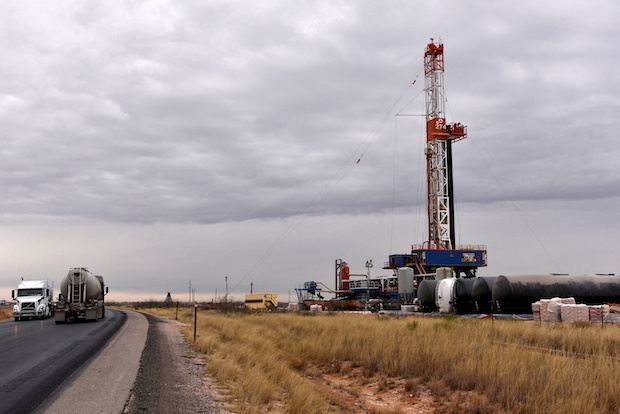Oil tops $120 a barrel on Saudi pricing despite OPEC+ deal

A drilling rig operates in the Permian Basin oil and natural gas production area in Lea County, New Mexico, US, Feb. 10, 2019. (REUTERS/Nick Oxford/File Photo)
LONDON — Oil prices topped $120 a barrel in choppy trade on Monday buoyed by Saudi Arabia raising its July crude prices but amid doubts that a higher output target for OPEC+ oil producers would ease tight supply.
Brent crude was up 64 cents, or 0.5%, to $120.36 a barrel at 1339 GMT after touching an intraday high of $121.95.
US West Texas Intermediate (WTI) crude futures rose 63 cents, or 0.5%, to $119.50 a barrel after hitting a three-month high of $120.99.
Saudi Arabia raised the July official selling price (OSP) for its flagship Arab light crude to Asia by $2.10 from June to a $6.50 premium, the highest since May, when prices hit all-time highs due to worries of disruption in supplies from Russia.
The price increase followed a decision last week by the Organization of the Petroleum Exporting Countries and allies, together called OPEC+, to boost output for July and August by 648,000 barrels per day, or 50% more than previously planned.
The increased target was spread across all OPEC+ members, however, many of which have little room to increase output — including Russia, which faces Western sanctions.
“With only a handful of… OPEC+ participants with spare capacity, we expect the increase in OPEC+ output to be about 160,000 barrels per day in July and 170,000 bpd in August,” JP Morgan analysts said in a note.
On Monday, Citibank and Barclays raised their price forecasts for 2022 and 2023, saying they expected Russian output and exports to fall by around 1-1.5 million bpd by end-2022.
Separately, Italy’s Eni and Spain’s Repsol could begin shipping small volumes of Venezuelan oil to Europe as soon as next month, five people familiar with the matter told Reuters.
RELATED STORIES
Asian markets track Wall Street up before jobs data, oil holds gains
Saudi Arabia to raise oil production if Russian output falls under sanctions — report
Asian markets drop on recession fears, output report drags oil down